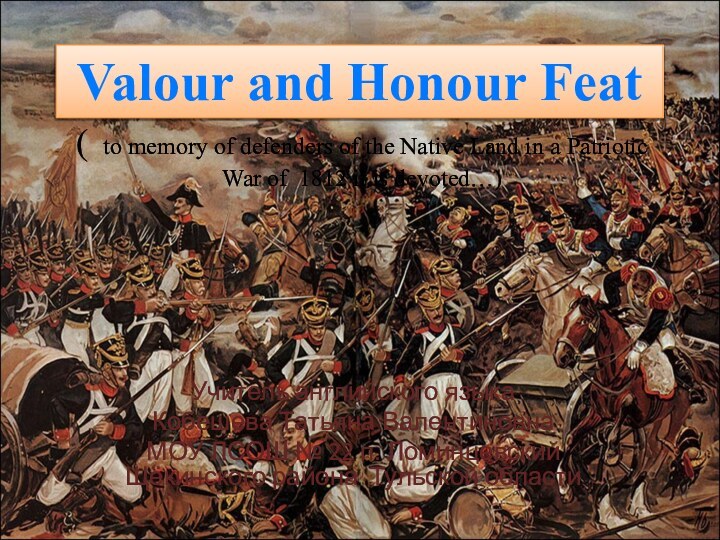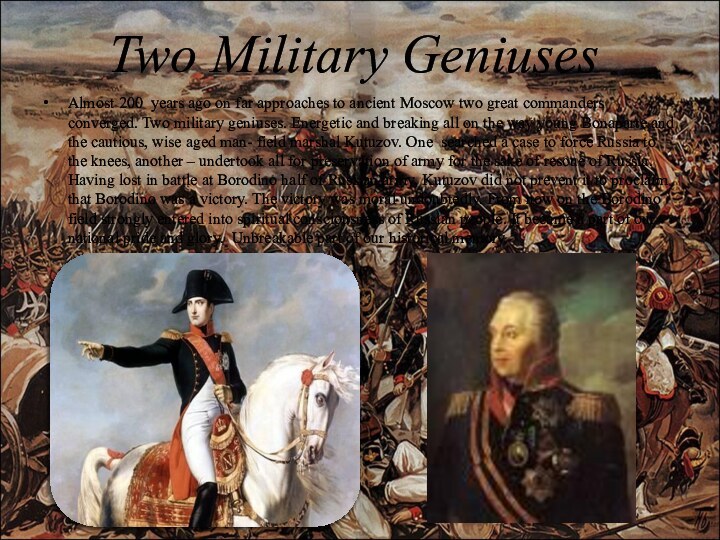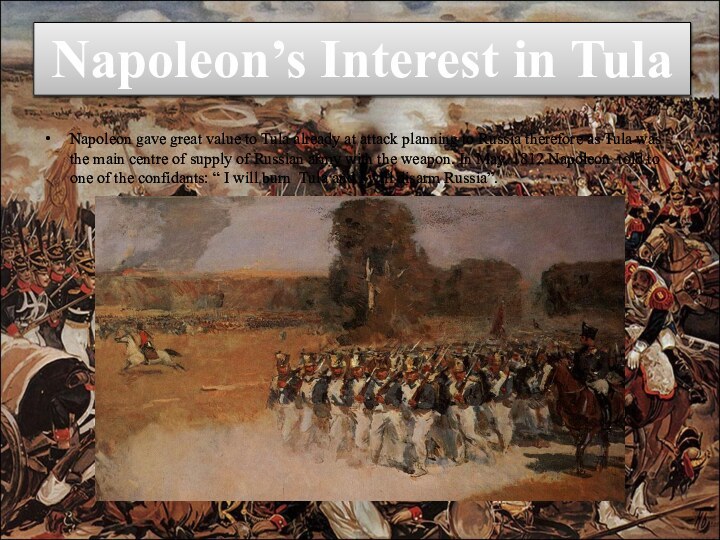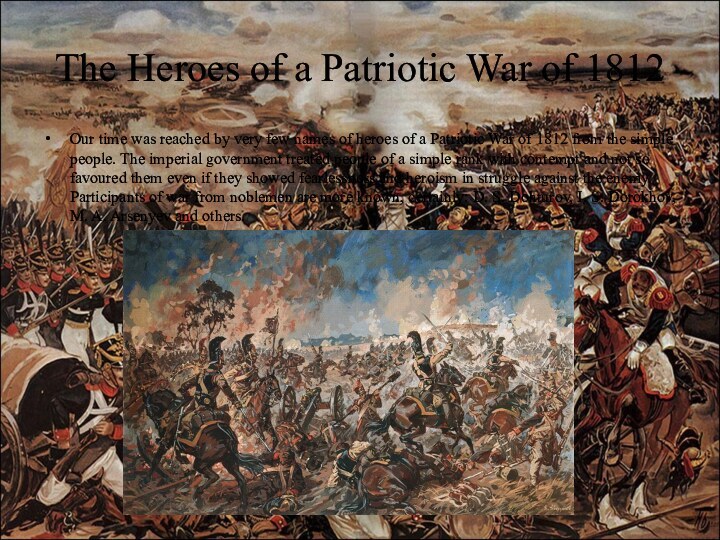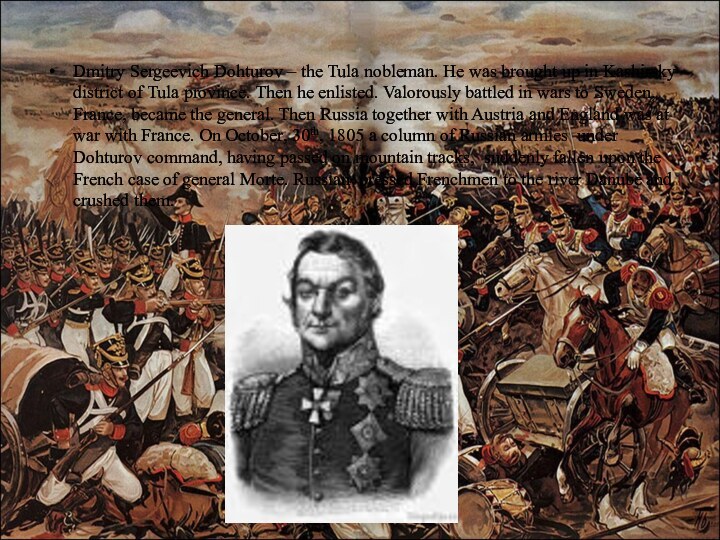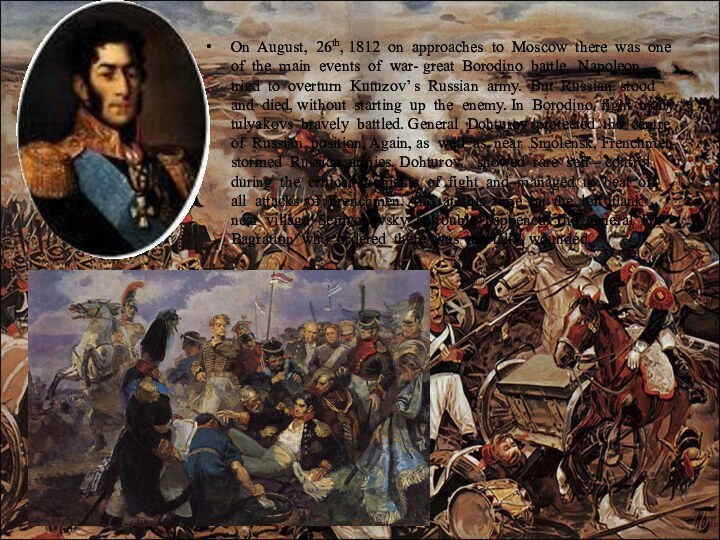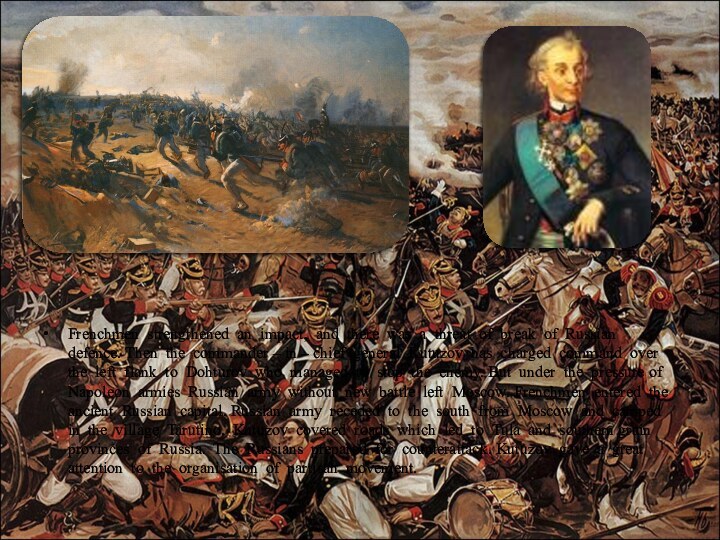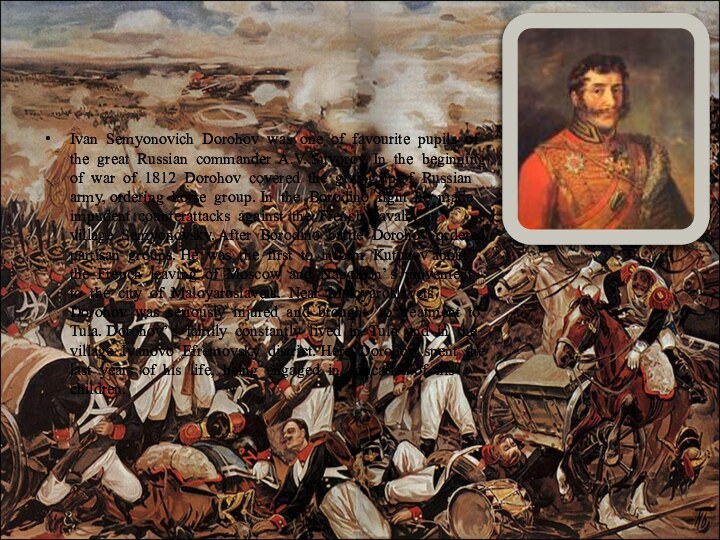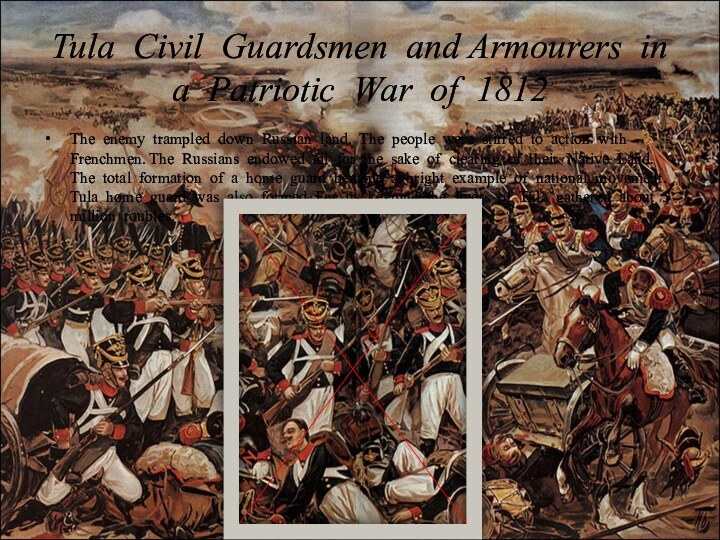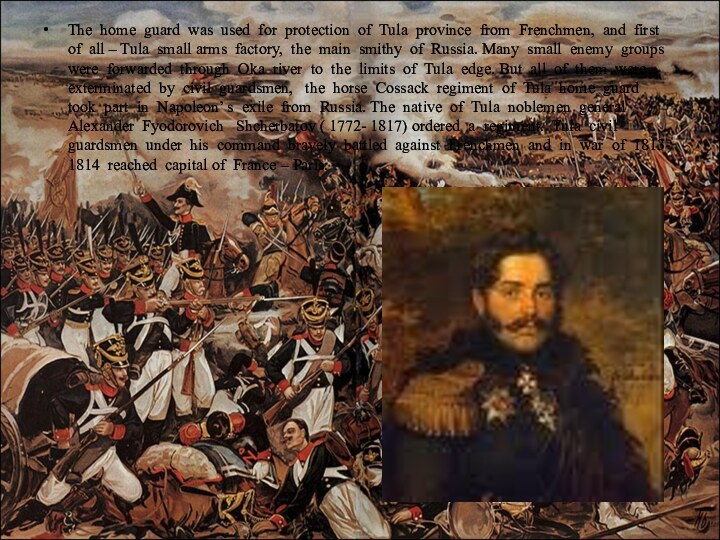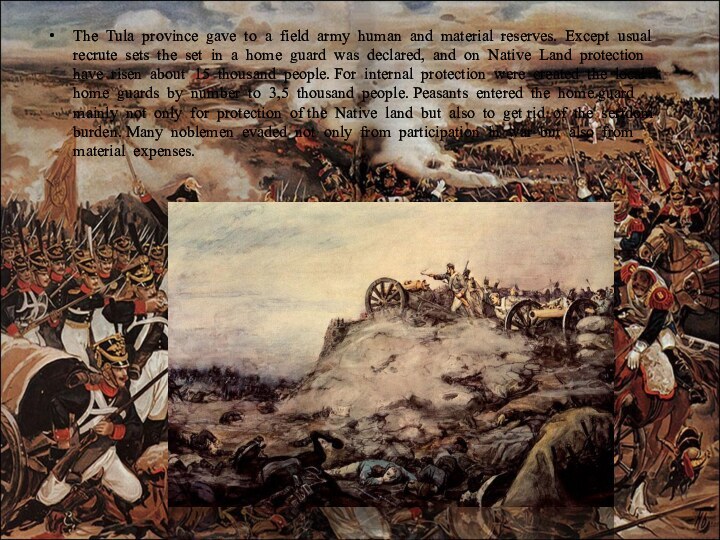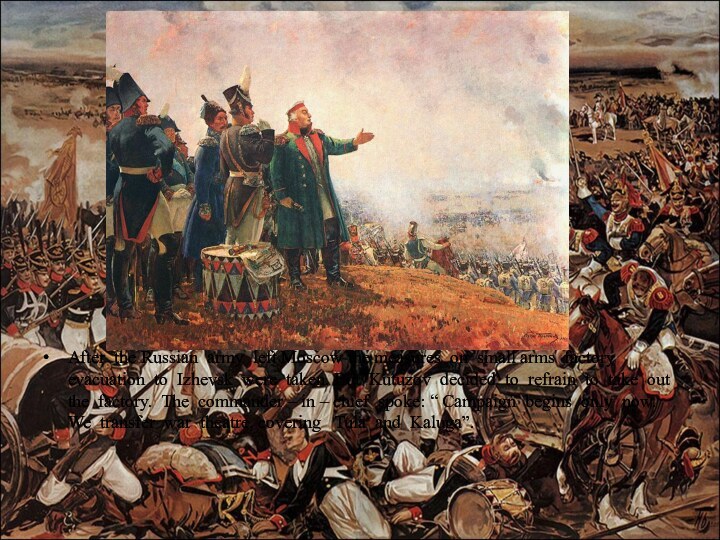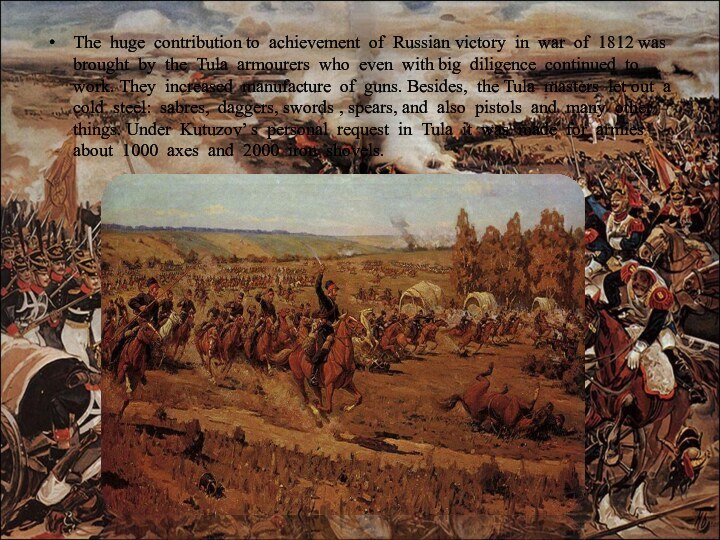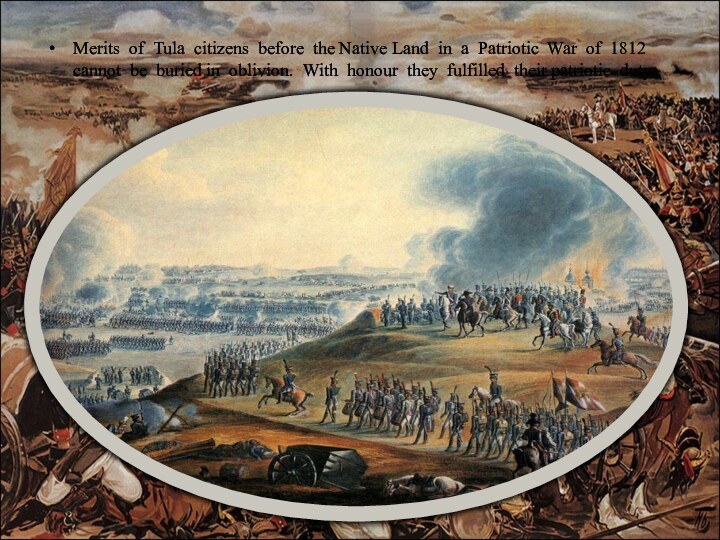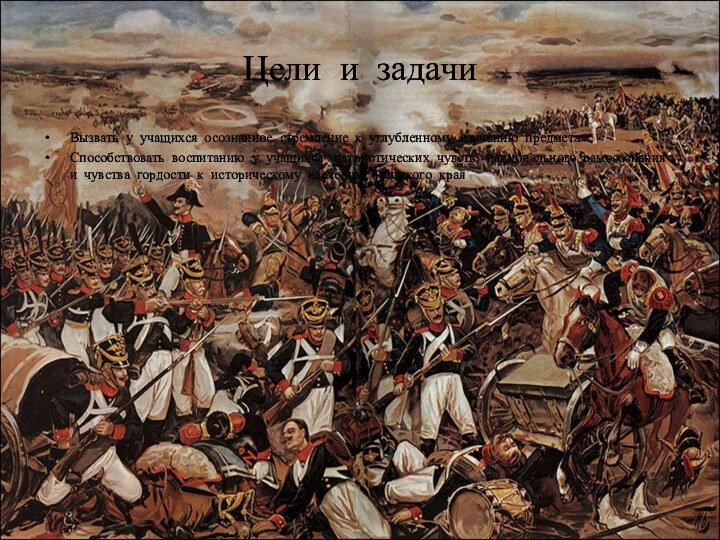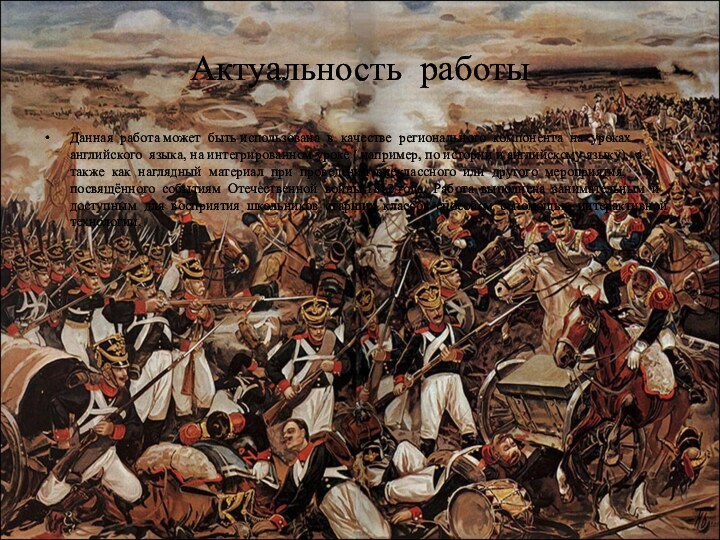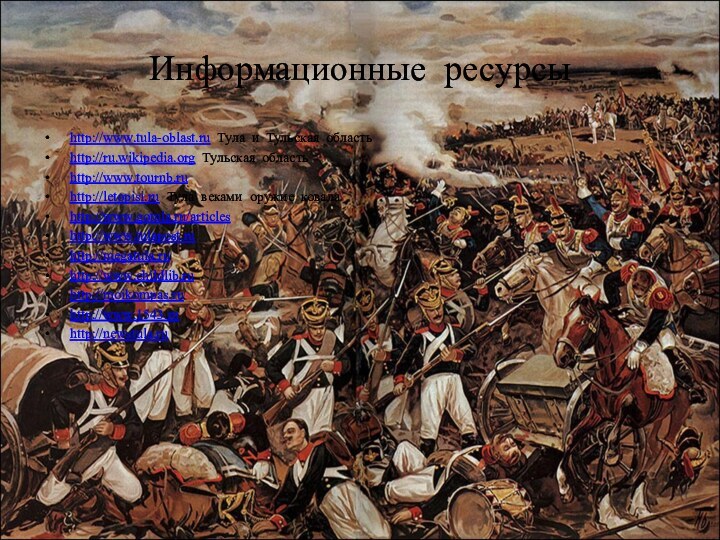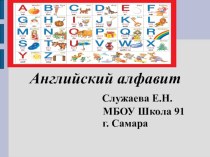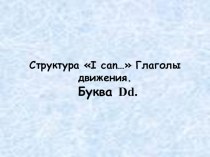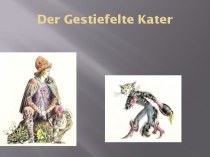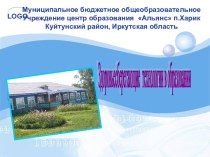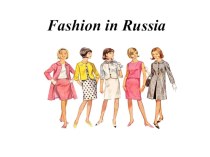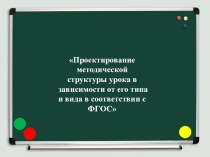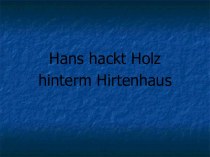Слайд 2
Almost 200 years ago on far approaches to
ancient Moscow two great commanders converged. Two military geniuses.
Energetic and breaking all on the way young Bonaparte and the cautious, wise aged man- field marshal Kutuzov. One searched a case to force Russia to the knees, another – undertook all for preservation of army for the sake of rescue of Russia. Having lost in battle at Borodino half of Russian army, Kutuzov did not prevent it to proclaim that Borodino was a victory. The victory was moral undoubtedly. From now on the Borodino field strongly entered into spiritual consciousness of Russian people. It became a part of our national pride and glory. Unbreakable part of our historical memory.
Two Military Geniuses
Слайд 3
Napoleon gave great value to Tula already at
attack planning to Russia therefore as Tula was the
main centre of supply of Russian army with the weapon. In May, 1812 Napoleon told to one of the confidants: “ I will burn Tula and I will disarm Russia”.
Napoleon’s Interest in Tula
Слайд 4
The Heroes of a Patriotic War of 1812
Our
time was reached by very few names of heroes
of a Patriotic War of 1812 from the simple people. The imperial government treated people of a simple rank with contempt and not so favoured them even if they showed fearlessness and heroism in struggle against the enemy. Participants of war from noblemen are more known, certainly: D. S. Dohturov, I. S. Dorokhov, M. A. Arsenyev and others.
Слайд 5
Dmitry Sergeevich Dohturov – the Tula nobleman. He
was brought up in Kashirsky district of Tula province.
Then he enlisted. Valorously battled in wars to Sweden, France, became the general. Then Russia together with Austria and England was at war with France. On October, 30th, 1805 a column of Russian armies under Dohturov command, having passed on mountain tracks, suddenly fallen upon the French case of general Morte. Russian pressed Frenchmen to the river Danube and crushed them.
Слайд 6
Some time later – on November, 20th, 1805-
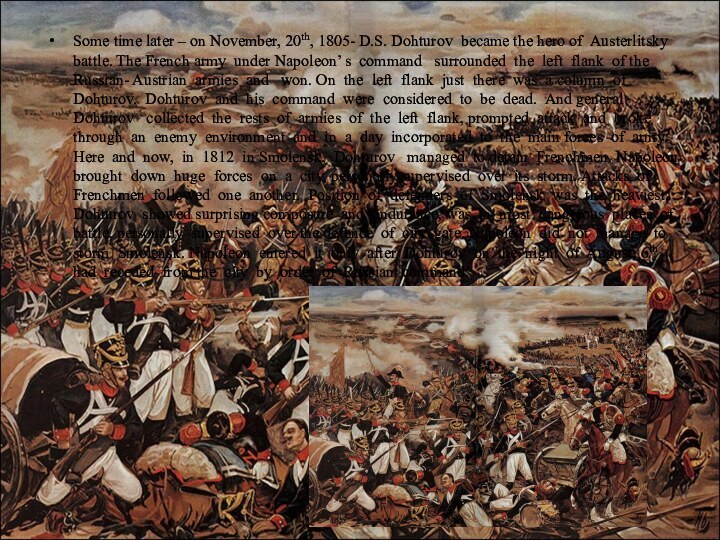
D.S. Dohturov became the hero of Austerlitsky battle. The
French army under Napoleon’ s command surrounded the left flank of the Russian- Austrian armies and won. On the left flank just there was a column of Dohturov. Dohturov and his command were considered to be dead. And general Dohturov collected the rests of armies of the left flank, prompted attack and broke through an enemy environment and in a day incorporated to the main forces of army. Here and now, in 1812 in Smolensk, Dohturov managed to detain Frenchmen. Napoleon brought down huge forces on a city, personally supervised over its storm. Attacks of Frenchmen followed one another. Position of defenders of Smolensk was the heaviest. Dohturov showed surprising composure and endurance, was in most dangerous places of battle, personally supervised over the defence of city gate. Napoleon did not manage to storm Smolensk. Napoleon entered it only after Dohturov on the night of August, 6th had receded from the city by order of Russian command.
Слайд 7
On August, 26th, 1812 on approaches to Moscow
there was one of the main events of war-
great Borodino battle. Napoleon tried to overturn Kutuzov’ s Russian army. But Russian stood and died, without starting up the enemy. In Borodino fight many tulyakovs bravely battled. General Dohturov protected the centre of Russian position. Again, as well as near Smolensk, Frenchmen stormed Russian armies. Dohturov showed rare self – control during the critical moments of fight and managed to beat off all attacks of Frenchmen. And at this time on the left flank near village Semyonovsky a trouble happened. The general P.I. Bagration who ordered there was mortally wounded.
Слайд 8
Frenchmen strengthened an impact, and there was a
threat of break of Russian defence. Then the commander
– in – chief general Kutuzov has charged command over the left flank to Dohturov who managed to stop the enemy. But under the pressure of Napoleon armies Russian army without new battle left Moscow. Frenchmen entered the ancient Russian capital. Russian army receded to the south from Moscow and camped in the village Tarutino. Kutuzov covered roads which led to Tula and southern grain provinces of Russia. The Russians prepared for counterattack. Kutuzov gave a great attention to the organisation of partisan movement.
Слайд 9
Ivan Semyonovich Dorohov was one of favourite pupils
of the great Russian commander A.V. Suvorov. In the
beginning of war of 1812 Dorohov covered the giving up of Russian army, ordering horse group. In the Borodino fight he made impudent counterattacks against the French cavalry at village Semyonovsky. After Borodino battle Dorohov ordered partisan groups. He was the first to inform Kutuzov about the French leaving of Moscow and Napoleon’ s movement to the city of Maloyaroslavets. Near Maloyaroslavets Dorohov was seriously injured and brought to treatment to Tula. Dorohov’ s family constantly lived in Tula and in the village Ivanovo Efremovsky district. Here Dorohov spent the last years of his life, being engaged in education of his children.
Слайд 10
Tula Civil Guardsmen and Armourers in a Patriotic
War of 1812
The enemy trampled down Russian land. The
people were stirred to action with Frenchmen. The Russians endowed all for the sake of clearing of their Native Land. The total formation of a home guard became a bright example of national movement. Tula home guard was also formed. For its keeping the livers of Tula gathered about 5 million roubles.
Слайд 11
The home guard was used for protection of
Tula province from Frenchmen, and first of all –
Tula small arms factory, the main smithy of Russia. Many small enemy groups were forwarded through Oka river to the limits of Tula edge. But all of them were exterminated by civil guardsmen, the horse Cossack regiment of Tula home guard took part in Napoleon’ s exile from Russia. The native of Tula noblemen general Alexander Fyodorovich Shcherbatov ( 1772- 1817) ordered a regiment. Tula civil guardsmen under his command bravely battled against Frenchmen and in war of 1813- 1814 reached capital of France – Paris.
Слайд 12
The Tula province gave to a field army
human and material reserves. Except usual recrute sets the
set in a home guard was declared, and on Native Land protection have risen about 15 thousand people. For internal protection were created the local home guards by number to 3,5 thousand people. Peasants entered the home guard mainly not only for protection of the Native land but also to get rid of the serfdom burden. Many noblemen evaded not only from participation in war but also from material expenses.
Слайд 13
After the Russian army left Moscow the measures
on small arms factory evacuation to Izhevsk were taken.
But Kutuzov decided to refrain to take out the factory. The commander – in – chief spoke: “ Campaign begins only now. We transfer war theatre, covering Tula and Kaluga”.
Слайд 14
The huge contribution to achievement of Russian victory
in war of 1812 was brought by the Tula
armourers who even with big diligence continued to work. They increased manufacture of guns. Besides, the Tula masters let out a cold steel: sabres, daggers, swords , spears, and also pistols and many other things. Under Kutuzov’ s personal request in Tula it was made for armies about 1000 axes and 2000 iron shovels.
Слайд 15
Merits of Tula citizens before the Native Land
in a Patriotic War of 1812 cannot be buried
in oblivion. With honour they fulfilled their patriotic duty.
Слайд 16
Цели и задачи
Вызвать у учащихся осознанное стремление к
углубленному изучению предмета
Способствовать воспитанию у учащихся патриотических чувств,
национального самосознания и чувства гордости к историческому наследию Тульского края
Слайд 17
Актуальность работы
Данная работа может быть использована в качестве
регионального компонента на уроках английского языка, на интегрированном уроке
( например, по истории и английскому языку), а также как наглядный материал при проведении внеклассного или другого мероприятия, посвящённого событиям Отечественной войны 1812 года. Работа выполнена занимательным и доступным для восприятия школьников старших классов способом с помощью интерактивной технологии.
